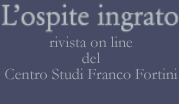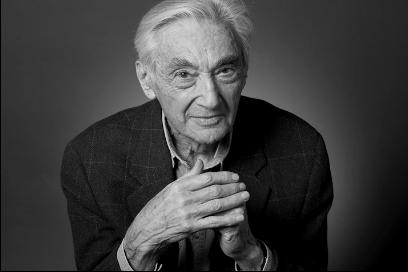Ricordo di Howard Zinn (1922-2010)
… Non m’interessa soltanto la produzione di libri e non mi interessa soltanto
tenere un corso dopo l’altro da cui usciranno persone di successo
che occuperanno diligentemente il posto preparato per loro
dalla società. Quello in cui dobbiamo essere impegnati – che siamo insegnanti
o scrittori, cineasti, sceneggiatori, registi, musicisti, attori,
qualunque cosa facciamo – non deve solo far sentire bene la gente
e farla sentire unita, ma deve anche educare una nuova generazione
per fare una modestissima cosa: cambiare il mondo.
(1999)
All’età di 87 anni, il 27 gennaio, a Santa Monica (California) è scomparso
Howard Zinn. Studioso di fama internazionale, docente di scienze politiche e
storia contemporanea all’Università di Boston, è tra gli storici più originali
ed autorevoli degli Stati Uniti d'America, ed uno dei padri della sinistra
radicale. Il suo libro più noto è Storia del popolo americano. Dal 1492 ad
oggi (Il Saggiatore, 2005; titolo originale A people's history of
United States: fino al 2003 oltre un milione di copie vendute solo negli
U.S.A.), nel quale racconta la storia degli Usa secondo la prospettiva non
della classe dirigente o colta, ma degli esclusi dalla storia, ovvero i nativi
americani, gli schiavi di colore, le donne, insomma i cosiddetti ''vinti'',
partendo dallo sbarco di Colombo per arrivare al tempo di Clinton. Nel libro
egli scrive:
«My point is not that we must, in telling history, accuse, judge, condemn Columbus in absentia. It is too late for that; it would be a useless scholarly exercise in morality. But the easy acceptance of atrocities as a deplorable but necessary price to pay for progress (Hiroshima and Vietnam, to save western civilization; Kronstadt and Hungary, to save socialism; nuclear proliferation, to save us all) – that is still with us. One reason these atrocities are still with us is that we have learned to bury them in a mass of other facts, as radioactive wastes are buried in containers in the earth.»
Cresciuto a Brooklin in una famiglia di operai e immigrati, dopo aver lavorato in un cantiere navale a 18 anni, prestò poi servizio nell’aviazione durante la seconda guerra mondiale. L’esperienza dei bombardamenti aerei è tra le esperienze all’origine della sua costante opposizione alla guerra. Laureatosi in Storia alla Columbia University, in seguito fu tra i principali attivisti per i diritti civili, insieme a Alice Walker e Marian Wright tra gli altri. La più recente onorificenza gli è stata attribuita nel 2010, quando la New York University gli ha conferito il premio “Martin Luther King” per l’impegno umanitario. Di recente, un documentario basato su A People's History e raccontato da lui stesso è stato prodotto da History Channel, con la partecipazione di Bob Dylan, Morgan Freeman, Bruce Springsteen ed altri artisti.
Una rassegna stampa ed un’ampia scelta di testi e di interventi in video è consultabile sul sito: www.howardzinn.org
Tra le traduzioni italiane dei suoi libri ricordiamo: Disobbedienza e democrazia. Lo spirito della ribellione, 2006, Ed. Net; Dissento. Storie di artisti in tempo di guerra, 2005, Nuovi Mondi; Il fantasma del Vietnam. E altri scritti su terrorismo e guerra, 2005, Datanews; Disobbedienza e democrazia. Lo spirito della ribellione, 2003, Il Saggiatore; Non in nostro nome, 2003, Il Saggiatore; Marx a Soho. Un monologo sulla storia, 2001, Editori Riuniti.
Tra i suoi interventi recenti ricordiamo l’articolo sul «Guardian» del 10 ottobre 2009 riguardante l’assegnazione del Premio Nobel per la Pace a Barack Obama. In quell’occasione egli scrisse:
«I was dismayed when I heard Barack Obama was given the Nobel peace prize. A shock, really, to think that a president carrying on two wars would be given a peace prize. Until I recalled that Woodrow Wilson, Theodore Roosevelt, and Henry Kissinger had all received Nobel peace prizes. The Nobel committee is famous for its superficial estimates, won over by rhetoric and by empty gestures, and ignoring blatant violations of world peace.Yes, Wilson gets credit for the League of Nations – that ineffectual body which did nothing to prevent war. But he had bombarded the Mexican coast, sent troops to occupy Haiti and the Dominican Republic and brought the US into the slaughterhouse of Europe in the first World War, surely among stupid and deadly wars at the top of the list.Sure, Theodore Roosevelt brokered a peace between Japan and Russia. But he was a lover of war, who participated in the US conquest of Cuba, pretending to liberate it from Spain while fastening US chains on that tiny island. And as president he presided over the bloody war to subjugate the Filipinos, even congratulating a US general who had just massacred 600 helpless villagers in the Phillipines. The Committee did not give the Nobel prize to Mark Twain, who denounced Roosevelt and criticised the war, nor to William James, leader of the anti-imperialist league. Oh yes, the committee saw fit to give a peace prize to Henry Kissinger, because he signed the final peace agreement ending the war in Vietnam, of which he had been one of the architects. Kissinger, who obsequiously went along with Nixon's expansion of the war, with the bombing of peasant villages in Vietnam, Laos and Cambodia. Kissinger, who matches the definition of a war criminal very accurately, is given a peace prize! People should be given a peace prize not on the basis of promises they have made – as with Obama, an eloquent maker of promises – but on the basis of actual accomplishments towards ending war, and Obama has continued deadly, inhuman military action in Iraq, Afghanistan and Pakistan.The Nobel peace committee should retire, and turn over its huge funds to some international peace organization which is not awed by stardom and rhetoric, and which has some understanding of history.»
Di seguito riportiamo il link , tratto dal sito di Peace reporter, al testo completo della conferenza tenuta da Howard Zinn a Roma, 23 giugno 2005.
La guerra giusta, Howard Zinn (Roma, 23 giugno 2005)
[2 febbraio 2010]
home> notizie> Ricordo di Howard Zinn (1922-2010)


